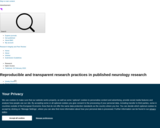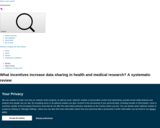
The objective of this study was to evaluate the nature and extent of reproducible and transparent research practices in neurology publications. Methods The NLM catalog was used to identify MEDLINE-indexed neurology journals. A PubMed search of these journals was conducted to retrieve publications over a 5-year period from 2014 to 2018. A random sample of publications was extracted. Two authors conducted data extraction in a blinded, duplicate fashion using a pilot-tested Google form. This form prompted data extractors to determine whether publications provided access to items such as study materials, raw data, analysis scripts, and protocols. In addition, we determined if the publication was included in a replication study or systematic review, was preregistered, had a conflict of interest declaration, specified funding sources, and was open access. Results Our search identified 223,932 publications meeting the inclusion criteria, from which 400 were randomly sampled. Only 389 articles were accessible, yielding 271 publications with empirical data for analysis. Our results indicate that 9.4% provided access to materials, 9.2% provided access to raw data, 0.7% provided access to the analysis scripts, 0.7% linked the protocol, and 3.7% were preregistered. A third of sampled publications lacked funding or conflict of interest statements. No publications from our sample were included in replication studies, but a fifth were cited in a systematic review or meta-analysis. Conclusions Currently, published neurology research does not consistently provide information needed for reproducibility. The implications of poor research reporting can both affect patient care and increase research waste. Collaborative intervention by authors, peer reviewers, journals, and funding sources is needed to mitigate this problem.
- Subject:
- Applied Science
- Biology
- Health, Medicine and Nursing
- Life Science
- Social Science
- Material Type:
- Reading
- Provider:
- Research Integrity and Peer Review
- Author:
- Austin L. Johnson
- Daniel Tritz
- Jonathan Pollard
- Matt Vassar
- Shelby Rauh
- Trevor Torgerson
- Date Added:
- 08/07/2020
